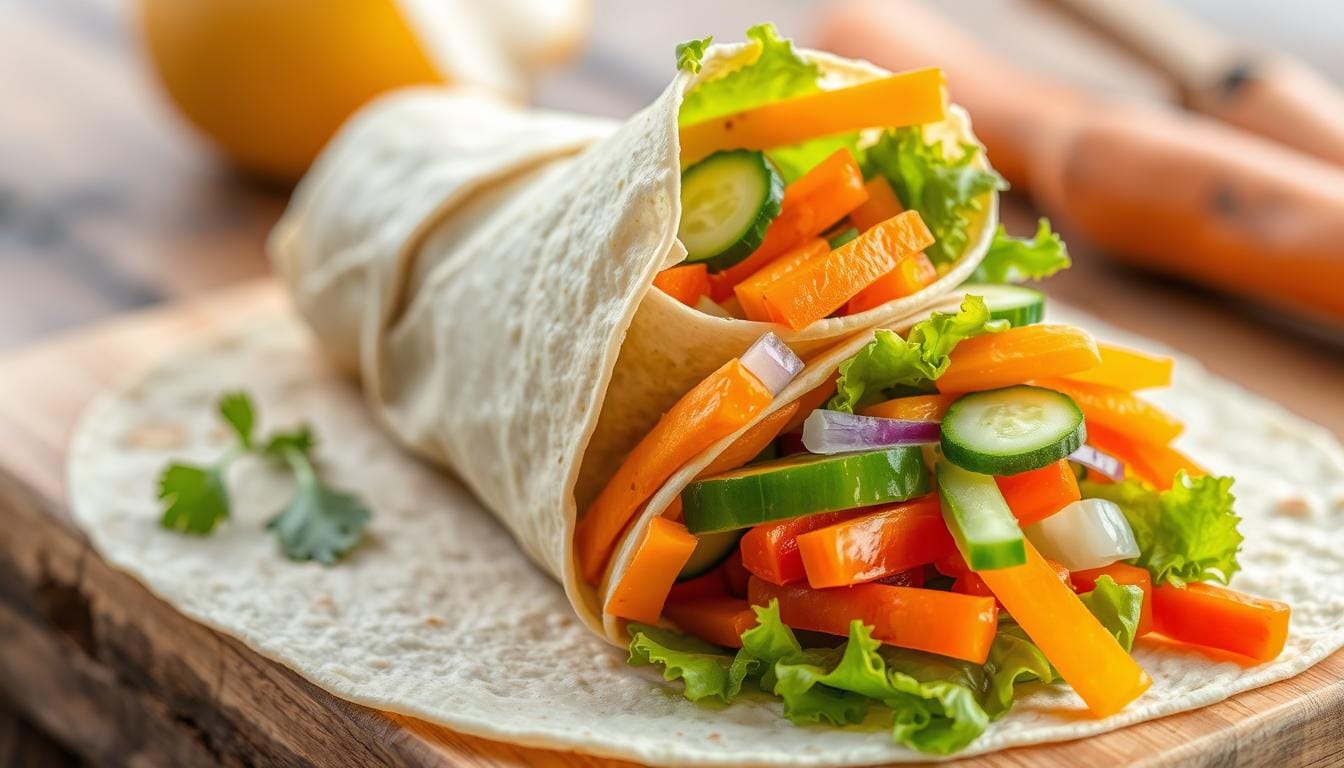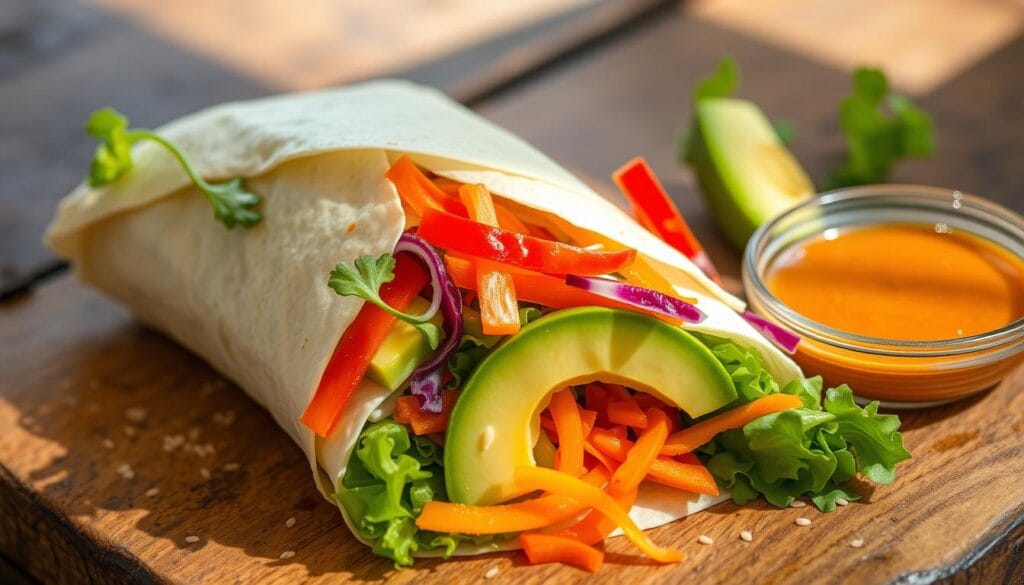A veggie wrap is a tasty and healthy meal choice. It’s easy to make and can be tailored with various ingredients. It’s perfect for those who want a meatless meal that’s still filling.
Eating a veggie wrap can boost your energy all day. You can pick from many ingredients to make a wrap that fits your taste and diet. Whether you like a classic wrap or something new, there’s something for everyone.
Key Takeaways
- A veggie wrap is a healthy and delicious lunch option
- A vegetarian wrap can be customized with a variety of ingredients
- Eating a veggie wrap can provide the nutrients you need to stay energized
- Veggie wraps can be made to suit different taste preferences and dietary needs
- There are many different combinations of ingredients to choose from
- Veggie wraps are a great option for those looking for a meatless meal
What Makes the Perfect Veggie Wrap
A healthy wrap is more than food; it’s an experience. To make the perfect veggie wrap, balance flavors, textures, and how it looks. Start with a whole-grain wrap for a nutritious base.
There are countless fillings to choose from. You might like hummus, cucumber, and tomato, or try roasted veggies, avocado, and sprouts. Mix crunchy, soft, and smooth textures. Add protein like chickpeas, black beans, or tofu to stay full.
Flavor combinations are key to a great veggie wrap. Explore cuisines like Mediterranean or Asian-fusion for a unique taste. Some tasty combos include:
- Roasted vegetables with tahini sauce
- Grilled tofu with peanut sauce and pickled carrots
- Quinoa and black bean bowl with salsa and guacamole
Try different ingredients and flavors to make a delicious, healthy wrap. Whether you want something simple or bold, the perfect veggie wrap is within reach.
| Wrap Type | Fillings | Flavor Profile |
|---|---|---|
| Classic Veggie | Hummus, cucumber, tomato | Mild, refreshing |
| Roasted Veggie | Roasted vegetables, tahini sauce | Earthy, savory |
| International | Grilled tofu, peanut sauce, pickled carrots | Spicy, exotic |
Health Benefits of Choosing a Veggie Wrap
A veggie wrap recipe is a great choice for a healthy lunch. It’s easy to make and full of nutrients. A good easy veggie wrap can give you energy and help you feel well.
Some key health benefits of a veggie wrap are:
- High fiber from whole wheat wraps and fresh veggies
- Rich in vitamins and minerals from colorful veggies
- Good source of protein from hummus, avocado, or other plant-based sources
Adding a veggie wrap recipe to your diet is good for your health. An easy veggie wrap is a tasty and healthy meal to take with you. It’s perfect for a quick lunch or a healthy snack.
Choosing a veggie wrap is good for your body and the planet. It supports a plant-based diet, which is better for animals and the environment. So, try an easy veggie wrap next time you need a meal and enjoy its health benefits.
Essential Ingredients for Your Veggie Wrap
To make a tasty veggie wrap, picking the right ingredients is key. A veggie wrap is more than food; it’s a mix of flavors, textures, and looks. Think about the balance of taste, texture, and health when choosing your ingredients.
A delicious veggie wrap begins with a good wrap. You can pick from many wraps like whole wheat, whole grain, or gluten-free. The wrap you choose depends on your diet and taste.
Wrap Options
- Whole wheat wrap: a good source of fiber and nutrients
- Whole grain wrap: rich in fiber, vitamins, and minerals
- Gluten-free wrap: a great option for those with gluten intolerance
Fresh Vegetables
Fresh veggies add crunch, taste, and nutrients to your wrap. Some favorites are:
- Lettuce
- Tomatoes
- Cucumbers
- Carrots
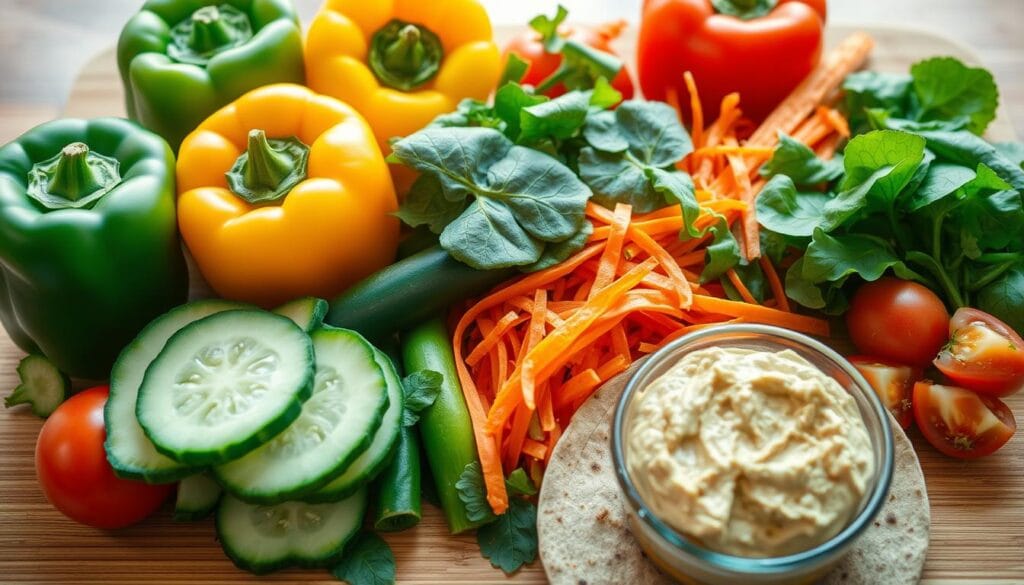
Protein Sources
Adding protein to your wrap keeps you full and happy. Some top picks are:
- Humus
- Avocado
- Grilled chicken
- Tofu
With the right ingredients, you can make a delicious veggie wrap that’s both healthy and filling.
| Ingredient | Nutritional Value |
|---|---|
| Whole wheat wrap | 100 calories, 2g protein, 2g fat |
| Fresh vegetables | 50 calories, 1g protein, 0g fat |
| Humus | 100 calories, 2g protein, 10g fat |
Step-by-Step Veggie Wrap Assembly
To make a tasty homemade veggie wrap, start by placing a large tortilla or flatbread on a clean surface. Spread a layer of hummus or your favorite sauce in the center. Make sure to leave a small border around the edges.
Then, add fresh veggies like lettuce, tomatoes, cucumbers, and bell peppers. You can also add beans, tofu, or tempeh for protein. The goal is to mix flavors and textures well.
Here are some tips for assembling your veggie wrap:
- Layer ingredients in a logical order, with the largest items at the bottom and the smallest at the top.
- Don’t overfill the wrap, as this can make it difficult to roll and can lead to a messy eating experience.
- Experiment with different combinations of ingredients to find your favorite flavor profiles.
After adding all your ingredients, it’s time to roll up your homemade veggie wrap. Fold the bottom edge over the filling, then fold in the sides. Roll the wrap up tightly. Slice in half and serve right away.
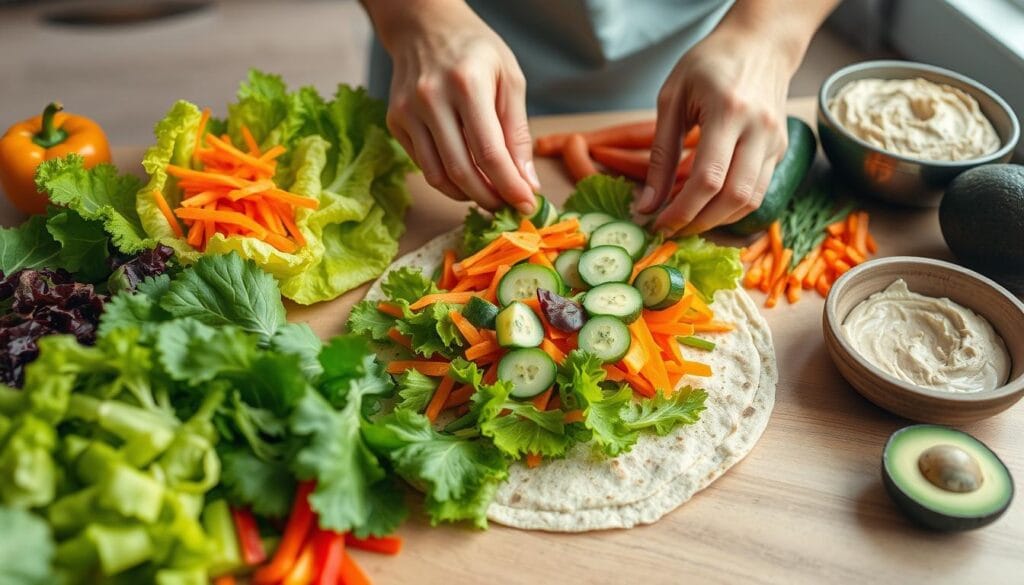
Must-Try Veggie Wrap Combinations
Creating a delicious and healthy wrap is easy. A vegetarian wrap is perfect for a nutritious meal. Try different ingredients and flavors to make your wrap stand out.
A healthy wrap combines fresh veggies, whole grains, and lean proteins. Here are some tasty combinations:
- Mediterranean Style: hummus, tabbouleh, and feta cheese
- Asian Fusion: pickled ginger, soy sauce, and stir-fried veggies
- Mexican Inspired: guacamole, salsa, and black beans
These combos are great starting points. Feel free to mix and match to find your favorite.
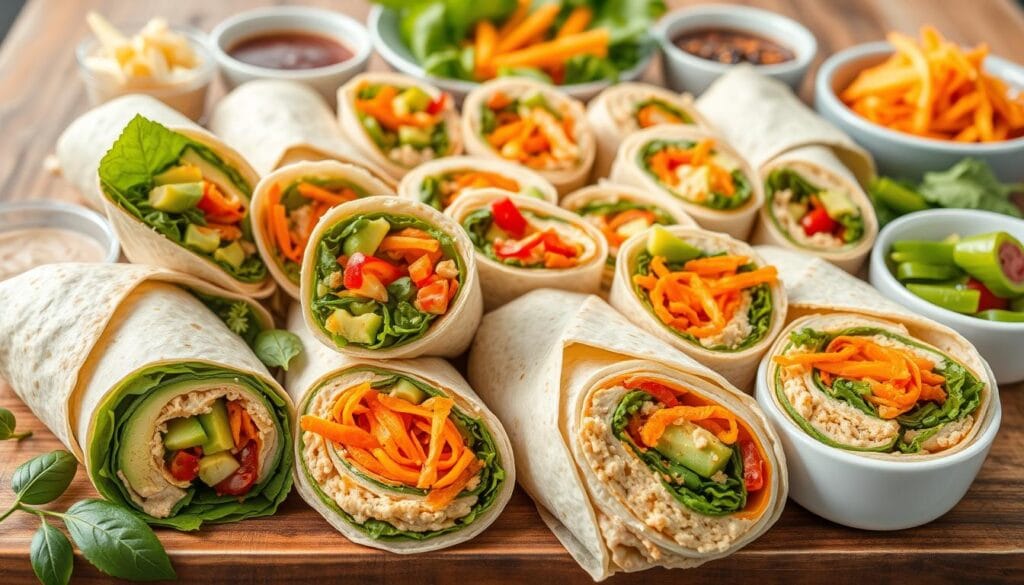
Exploring these combinations will help you make many tasty wraps. Whether you like classic or adventurous flavors, there’s a wrap for you.
| Wrap Combination | Ingredients | Flavor Profile |
|---|---|---|
| Mediterranean Style | hummus, tabbouleh, feta cheese | fresh, tangy, savory |
| Asian Fusion | pickled ginger, soy sauce, stir-fried vegetables | sweet, sour, umami |
| Mexican Inspired | guacamole, salsa, black beans | creamy, spicy, smoky |
Common Mistakes to Avoid When Making Your Wrap
When making a tasty plant-based wrap, it’s easy to add too much filling. This can make your easy veggie wrap messy and unappealing. Start with a small amount of filling and add more if you need to.
Another mistake is using too much sauce. A good sauce can enhance your wrap’s flavors, but too much makes it soggy. Use sauce sparingly and balance it with other tastes.
Here are some tips to keep in mind when making your wrap:
- Choose a wrap that’s big enough for your filling but not too big.
- Balance your flavors with sweet, sour, and savory ingredients.
- Don’t be afraid to try new filling combinations.
A well-made plant-based wrap or easy veggie wrap is a healthy and tasty meal. By avoiding common mistakes and following these tips, you can make a delicious wrap that you’ll love making again.
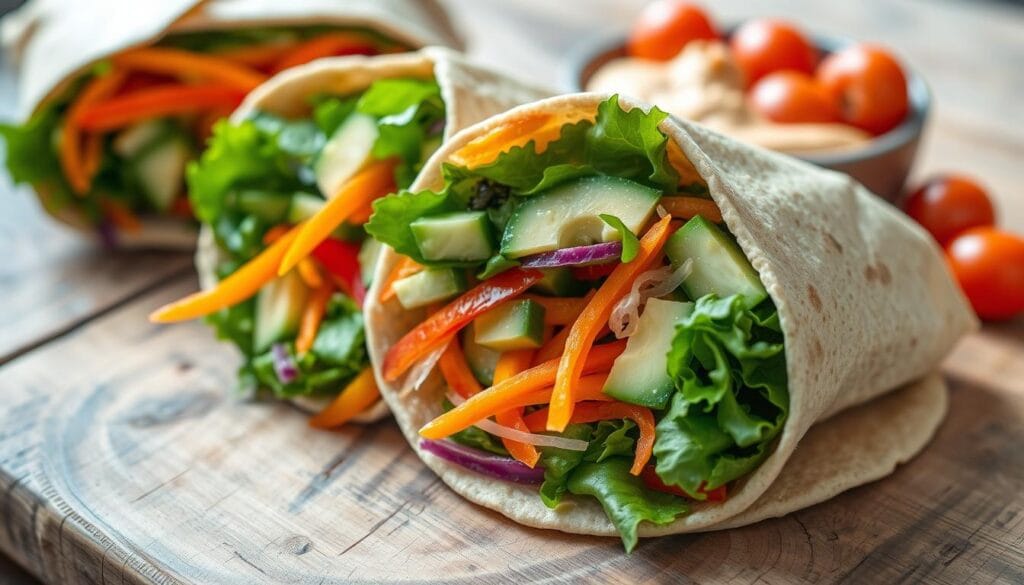
Remember, making wraps is a skill that improves with practice. Don’t get discouraged if your first few wraps don’t turn out right. Keep trying, and soon you’ll be making tasty wraps like a pro.
| Mistake | Solution |
|---|---|
| Overstuffing | Start with a moderate amount of filling and add more as needed |
| Too much sauce | Use a light hand when applying sauce and balance it with other flavors |
Make-Ahead Tips and Storage Guidelines
To enjoy a delicious veggie wrap recipe, it’s key to store and reheat it right. Veggie wraps can be made ahead, perfect for meal prep. Use a mix of ingredients for a tasty and healthy meal.
Here are some tips for making and storing veggie wraps:
- Prepare the filling ingredients, like veggies and hummus, and store them in separate containers in the fridge.
- Assemble the wrap just before eating to avoid a soggy tortilla.
- Use airtight containers to keep the wrap and its parts fresh for up to 3 days.
For reheating, try these methods:
- Microwave: Wrap the veggie wrap in a damp paper towel and heat for 20-30 seconds.
- Oven: Wrap the veggie wrap in foil and heat at 350°F (180°C) for 5-7 minutes.
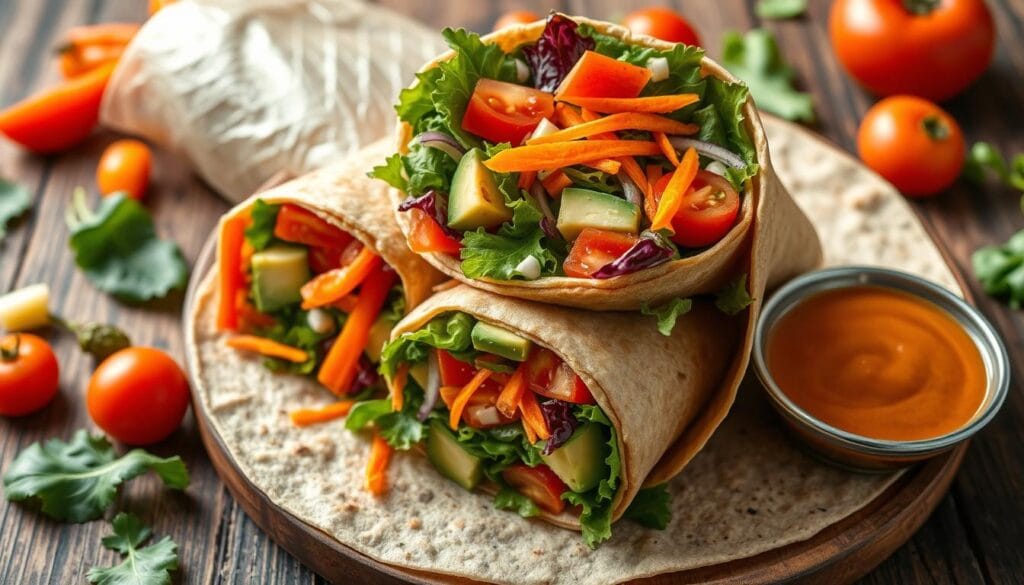
A delicious veggie wrap is great at any time. With these tips, your veggie wrap will stay fresh and tasty. These tips help make a healthy meal easy for busy people.
| Storage Method | Shelf Life |
|---|---|
| Refrigerator | 3 days |
| Freezer | 2 months |
Customizing Your Veggie Wrap for Different Dietary Needs
Creating a tasty homemade veggie wrap means thinking about everyone’s dietary needs. Whether you’re gluten-free, vegan, or watching carbs, you can adjust your veggie wrap ingredients easily.
First, pick the right wrap. For gluten-free, use rice flour or corn tortillas. Vegans should choose animal-free wraps and add hummus or avocado. Low-carb folks can try lettuce wraps or portobello mushroom caps.
Here are some tips for customizing your veggie wrap ingredients:
- Choose colorful veggies like bell peppers, cucumbers, and carrots for texture and taste.
- Add beans, lentils, or tofu for protein to keep you full.
- Use avocado or nuts for healthy fats to make your wrap creamy and crunchy.
By using these tips and thinking about your dietary needs, you can make a delicious homemade veggie wrap. It’s perfect for a quick lunch or a healthy snack.
| Dietary Need | Customization Option |
|---|---|
| Gluten-free | Rice flour wrap or corn tortilla |
| Vegan | Hummus or avocado spread, vegan protein sources |
| Low-carb | Lettuce wrap or portobello mushroom cap |
Serving Suggestions and Side Dishes
There are many ways to serve a veggie wrap. A good vegetarian wrap can be paired with different sides for a complete meal. Try it with a mixed greens salad, cherry tomatoes, and a light vinaigrette for a healthy choice.
Other sides like roasted vegetables, quinoa, or brown rice can also enhance your meal. They add flavor and nutrients. For a bigger side, lentil soup or grilled vegetables are great options.
Complementary Sides
- Mixed greens salad with cherry tomatoes and vinaigrette dressing
- Roasted vegetables, such as broccoli or Brussels sprouts
- Quinoa or brown rice with a drizzle of olive oil and lemon juice
- Lentil soup with a side of whole grain bread
Presentation Tips
To make your meal look good, garnish your veggie wrap with fresh herbs like parsley or basil. A sprinkle of sumac or paprika can add color. Serve the wrap on a big plate or platter with sides arranged creatively.
Follow these tips to make a tasty and satisfying meal. Whether it’s a vegetarian or veggie wrap, the key is to have fun and be creative with your sides and presentation.
Seasonal Variations for Your Veggie Wrap
A healthy wrap is a fantastic way to enjoy the flavors of each season. With a bit of creativity, you can make a tasty meal that changes with the seasons. Try using fresh, local ingredients in your plant-based wrap.
Here are some ideas for seasonal wraps:
- Spring: Add fresh spinach, strawberries, and feta cheese to your wrap for a sweet and savory mix.
- Summer: Use juicy tomatoes, crispy cucumbers, and creamy hummus for a light and refreshing meal.
- Autumn: Add roasted butternut squash, apples, and caramelized onions for a warm, comforting taste.
- Winter: Warm up your wrap with roasted sweet potatoes, black beans, and a drizzle of tahini sauce.
These ideas are just the beginning. Feel free to experiment with different ingredients. Find the perfect mix that you love. With a little creativity, you can enjoy a healthy wrap that’s both delicious and satisfying. Plus, it will feature the freshest ingredients of the season.
Conclusion
The easy veggie wrap is a great choice for lunch. It’s full of tasty flavors and good for you. You can mix fresh veggies, protein, and spreads to make a wrap that’s both healthy and delicious.
Choosing a veggie wrap is a smart way to care for your health. These wraps are full of vitamins, minerals, and fiber. Plus, you can make them your own, fitting your taste and diet.
Try out different veggie wrap styles, like Mediterranean or Asian-fusion. Find your favorite lunch. Making the delicious veggie wrap a regular choice will keep you healthy and happy.

